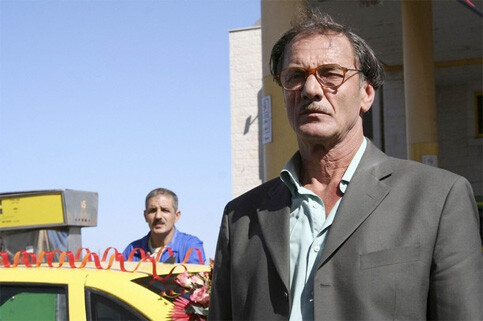The Electronic Intifada 19 October 2008

Mohammad Bakri in Laila’s Birthday.
In his new feature film, Laila’s Birthday, director Rashid Masharawi paints a bittersweet picture of life in the West Bank city of Ramallah. There, Masharawi’s main character, Abu Laila (played by the legendary Palestinian actor Mohammad Bakri), struggles to make ends meet as a taxi driver while attempting to get a license to work as a judge from the bureaucratic Palestinian Authority. Laila’s Birthday follows a day of Abu Laila’s life, taking the audience on a journey of absurdity in a place where Israeli soldiers may not be present (not a single Israeli soldier is seen) but where the occupation leaves chaos in its wake, and where petty lords enjoy sumptuously decorated ministry offices.
Abu Laila’s day starts off when he is awoken by the loud crash of breaking glass. He inspects his house where everything appears normal, but the dissonant soundtrack reminds us that appearances are deceiving. Indeed, when Abu Laila pulls out of his driveway in his yellow taxi, Ramallah is tranquil, even beautiful. However, as Abu Laila’s day grows more and more complex (though his purpose that day — to buy his daughter a birthday cake and gift — is anything but complicated), we see how illusory peace in Ramallah really is.
One of the main themes of the film, which may be most appreciated by those who actually live under the Palestinian Authority’s pageantry rule, is introduced when Abu Laila goes to the Ministry of Justice (one of his passengers exclaims that he was not aware such a thing existed in his country). As he walks into the office, a portrait of Mahmoud Abbas is being hung next to that of Yasser Arafat, and Abu Laila finds that the new minister is moving into his office (there had just been a ministry makeover the month before when a different government was in power). Abu Laila is humored by the minister until a staffer asks whether it is his yellow taxi that is blocking the truck delivering the ministry’s new curtains. Refusing to be humiliated by the smug minister, Abu Laila explains that he had worked as a judge in another country but had returned to Palestine to serve his people. After Abu Laila exits the ministry and proceeds to pick up passengers throughout the day, he continues to try to do the right thing but his efforts are frustrated and his idealism is constantly tested.
Laila’s Birthday would be received very well in the city where it was filmed, as a Ramallah audience would most appreciate their fellow resident Masharawi’s dark humor. While Abu Laila waits outside his taxi for passengers, a Palestine Radio news broadcast reports that human rights organizations protest the ongoing siege of Gaza; the Arab League has convened and condemned the siege using all of the synonyms for “condemn” that can be found in a thesaurus; the Palestinian prime minister issued a statement from somewhere; and meanwhile, the Israeli prime minister promised to continue with the colonization of Palestine. And now back to the regularly programmed Lebanese pop music.
A Palestinian audience might also best appreciate the parallel Masharawi makes between Abu Laila’s summoud, or steadfastness, to that of the donkey. Using a metaphor that is not new but works beautifully in the film, Masharawi makes this analogy when Abu Laila finds a donkey thrown up into the air by an Israeli missile that struck a nearby car. The donkey, his owner tells Abu Laila, is being driven crazy by the explosions and the ambulance sirens, but still he must go on. And so must Abu Laila, though even he has his breaking point.
Laila’s Birthday is a solid contribution to Palestinian national cinema — which, as scholar Hamid Dabashi has pointed out and celebrated, is unique amongst national cinemas in that the genre exists before the state (no wonder there is so much humor of the absurd in Palestinian cinema). Bakri memorably portrays Abu Laila’s simmering anger that betrays his otherwise calm demeanor by his clenched jaw and sweaty brow. Abu Laila is the true Palestinian hero, the father that tries to provide a good life to his child, and who tries to do right despite being constantly wronged by the world.
Related Links




